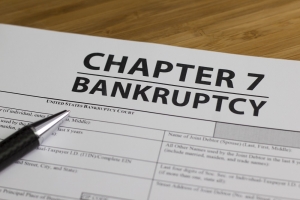Chapter 7 Bankruptcy
Chapter 7 Bankruptcy
 When a person is faced with insurmountable debt that he cannot overcome without significant changes in the nature of the debt and the payments that are due, it may be time to file a Chapter 7 bankruptcy case. A Chapter 7 action provides a person with an opportunity to eliminate many types of unsecured debt. This provides a clean slate on which to build a strong financial foundation so that the person can move forward, build credit, and possibly purchase a house or other high-value items in the future. However, only certain individuals qualify for this type of filing.
When a person is faced with insurmountable debt that he cannot overcome without significant changes in the nature of the debt and the payments that are due, it may be time to file a Chapter 7 bankruptcy case. A Chapter 7 action provides a person with an opportunity to eliminate many types of unsecured debt. This provides a clean slate on which to build a strong financial foundation so that the person can move forward, build credit, and possibly purchase a house or other high-value items in the future. However, only certain individuals qualify for this type of filing.
The Means Test
In order to understand whether or not a person qualifies for a Chapter 7 filing, he must undertake a means test. This looks at the income of the individual. If a person or household is under the median income for a household of the same size in Arizona, then he does not have to go through the formal means test. However, it still may be possible to file a Chapter 7 action if the person is above the median income. The means test involves an analysis of a person’s income and expenses. The calculation looks at how much income is available over a five-year period to satisfy outstanding debt. If the income is low enough, then the person may pursue a Chapter 7 rather than Chapter 13 bankruptcy case.
A Chapter 7 Case
When a person files a Chapter 7 action, a trustee is appointed to the case. The person doing the filing must turn over all assets to the trustee that are not exempt under Arizona or federal law. Exempt assets are specifically listed and may be excluded from the bankruptcy estate up to a certain dollar amount. Exempt items may include clothing, household furnishings, and personal property. Secured assets up to a certain amount also may be excluded from the bankruptcy estate. However, most people who qualify for Chapter 7 bankruptcy do not have significant amounts of secured assets. A person also may avail himself of some federal exemptions – a skilled Phoenix bankruptcy attorney can help a filer maximize his exemptions. After the exempt property has been established, the trustee will then sell or otherwise liquidate the non-exempt assets and distribute the funds to creditors based on priority. Although many types of unsecured debt may be discharged as part of a Chapter 7 bankruptcy case, some debt that is not available for discharge includes:
- Student loans;
- Child support obligations;
- Alimony;
- Debt that was accumulated as the result of fraudulent activities;
- Some tax obligations; and
- Debt incurred as the result of purchasing luxury items in anticipation of bankruptcy filing.
One of the major considerations for a couple contemplating bankruptcy is how to obtain the best possible relief, which may involve a joint filing, with each person claiming the maximum exemptions allowed under the law.
Many people who are eligible to file a Chapter 7 bankruptcy action are able to wipe out most, if not all, of their debt. However, if they do have secured assets that they wish to keep, they may go through the process of reaffirming the debt. This acts as a promise to continue to make payments on these items as due and owing. It is important to consider this action carefully as a reaffirmation of the debt means that it cannot be discharged in bankruptcy for another eight (8) years. The simple act of determining what type of bankruptcy case to file requires careful consideration and a skilled Phoenix bankruptcy attorney will guide a person through the process.
